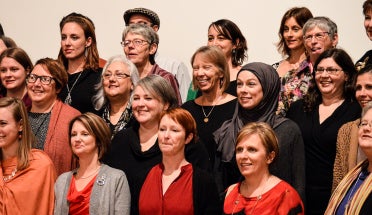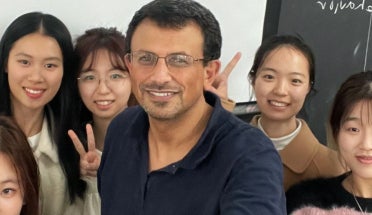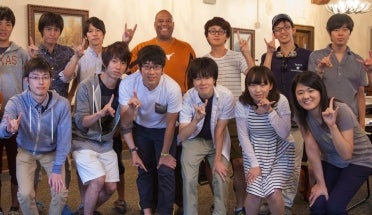
English Language Center Offers Remote Learning to Brazilian Mining Employees
- Jul 23, 2024
- Global Alumni Relations
- by Angela Santos
Near the eastern shores of Brazil, Igor Tabosa attends English classes remotely alongside his company colleagues twice a week. Facilitated by the English Language Center (ELC) at The University of Texas at Austin, the classes are part of a program resulting from a partnership with Fomento do Brasil, a company that promotes responsible mining and the development of local communities.
The initiative exemplifies the University’s commitment to creating partnerships for global impact, teaming with businesses to foster innovation and opportunity.
“My experience has been as positive as possible,” said Tabosa, Fomento’s sustainability manager, about the English classes. “I feel like I'm breaking down barriers.”
Beginning a Unique Partnership
Anuj Timblo — a UT Austin alumnus, member of the University's International Board of Advisors and Fomento’s executive director — looked to his undergraduate roots at the University to find tools for improving the Brazilian team’s professional development and global communication.
In November 2023, Timblo contacted the ELC to collaborate on devising a lesson plan for Fomento management employees. The first session of classes kicked off in March 2024.
As an international company with headquarters in India and branches in Australia and Singapore, Fomento conducts its business in English. However, the Brazilian branch employs the fewest English speakers among the company ranks.
“The English program developed for Fomento do Brasil plays a crucial role in the professional development of our team members, many of whom are interacting with native English speakers for the first time through this program,” said Timblo.

In keeping with the company’s dedication to employee training and professional development, the classes incorporate professional communication practices into a curriculum that builds English proficiency.
“Over the last few months of classes, we have had many engaging group discussions that relate both to work and to intercultural miscommunication,” said ELC instructor Matthew Cook. “We have also been focusing on written interactions through summary and reaction writing tasks, which have been either responses to novel data sets or models of professional communication such as email exchanges, message boards and short work reports.”
Community Impact in Brazil
As a global entrepreneur in mineral resources, Timblo has more than 15 years of experience in identifying, evaluating and developing mineral assets across numerous socio-political climates in the Americas, Africa, Asia and Oceania.
Fomento do Brasil focuses on iron ore projects in Brazil’s northeast region, developing sustainable initiatives that can make a positive impact on the local economic and social landscape.
Its project “Ferro Potiguar” is located in Rio Grande do Norte, one of the states most in need of economic development and employment. Alongside the company’s commitment to sustainability and community engagement in the area, Fomento prioritizes local employment and training.
“The English classes play a crucial role in this commitment and greatly increase the chances of upward mobility for its participants,” Timblo said. “As our operations grow in Brazil, we hope this program grows with it, offering more bespoke opportunities for our team.”
Assessment and Virtual Learning
Organizers conceived the plan for the ELC Fomento project in four phases: assessment, live online English classes, in-person training in Austin and training after participants’ visit to Austin. They implemented the first two phases on a trial basis to observe the program’s progress before deciding whether to continue with the final phases.
The first phase assessed participants on their English proficiency to classify them into either beginner, intermediate or advanced levels, assigning them to corresponding classes.
Participants then met for three hours per week during 12-week sessions in the second phase. The first session of classes ran March-June 2024, with reassessment at the end of each cycle to measure progress.
During the first eight weeks of the 12-week program, Ellen Butki, coordinator of the Talk Time conversation program and Academic English Program (who also coordinates the Fomento program for the ELC), reported “excellent participation and attendance.”
Conversational Progress
Participants also enjoy the option of attending weekly conversational practices virtually through Talk Time, a program that pairs ELC students with University students to facilitate discussions in English on a variety of topics.
“Instructors have surveyed students, and all report feeling their English has been improving in the courses,” Butki added. “In addition to their classes, many students have attended the optional conversation practice with UT students called Talk Time.”
Igor Tabosa engages in these conversations as a participant in the beginner English class.
“Yes, the challenges of learning a new language are great, but with the methodology used by the English Language Center and Talk Time conversation program, my listening and pronunciation skills have evolved noticeably,” Tabosa said. “Ellen is a teacher with a strong human orientation; she has the art of teaching in a simple and didactic way.”
Language Learning in Person
The next phase will allow eligible participants with high-intermediate or low-advanced proficiency levels to travel to Austin to further their English studies and professional development in person. Travel to a new country and face-to-face interactions with instructors will amplify the participants’ language learning as well as provide context for language cues.
The three-week sessions in Austin are set to include activities for language improvement and cultural enrichment. The immersive experience will include weekly cultural excursions in and outside of Austin.
The excursions and immersion will be designed to simultaneously enhance the participants' understanding of life in the U.S. and their understanding of English.
Upon returning from Austin, participants will embark on the program’s final phase, beginning with another 12-week session of live, online speaking classes for three hours a week. This will be followed by an additional 12 weeks of self-paced online pronunciation and writing training to ensure that students’ English proficiency remains intact.
The collaboration is already beginning to deliver benefits to Fomento do Brasil and its participants by enhancing language skills and professional development for individual participants and improving Fomento’s global communication and sustainable initiatives in Brazil — and simultaneously supporting UT Austin’s mission of enhancing global engagement through international partnerships.



